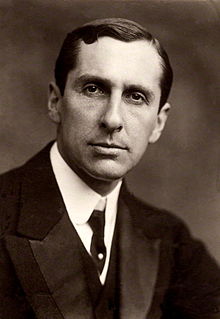Arthur Lee, 1st Viscount Lee of Fareham
|
The Right Honourable The Viscount Lee of Fareham GCB GCSI GBE PC |
|
|---|---|

Lord Lee of Fareham, 1903.
|
|
| First Lord of the Admiralty | |
|
In office 13 February 1921 – 31 October 1922 |
|
| Monarch | George V |
| Prime Minister |
David Lloyd George Andrew Bonar Law |
| Preceded by | Walter Long |
| Succeeded by | Leo Amery |
| Minister of Agriculture and Fisheries | |
|
In office 15 August 1919 – 13 February 1921 |
|
| Monarch | George V |
| Prime Minister | David Lloyd George |
| Preceded by | Rowland Edmund Prothero |
| Succeeded by | Arthur Griffith-Boscawen |
| Personal details | |
| Born |
Arthur Hamilton Lee 8 November 1868 Bridport, Dorset, England |
| Died | 21 July 1947 (aged 78) Avening, Gloucestershire, England |
| Nationality | British |
| Political party | Conservative |
| Education |
Cheltenham College Royal Military Academy, Woolwich |
| Occupation | Politician, statesman and public servant, soldier, philanthropist and patron of the arts. |
| Religion | Church of England |
Arthur Hamilton Lee, 1st Viscount Lee of Fareham, GCB, GCSI, GBE, PC (8 November 1868 – 21 July 1947) was an English soldier, diplomat, politician, philanthropist and patron of the arts. After military postings and an assignment to the British Embassy in Washington, he retired from the military in 1900. He entered politics, was first elected in 1900, and later served as Minister of Agriculture and Fisheries and First Lord of the Admiralty following the First World War. He donated his country house, Chequers, to the nation as a retreat for the Prime Minister, and co-founded the Courtauld Institute of Art.
Arthur Hamilton Lee was born at The Rectory, Bridport, Dorset in 1868. His father was rector of the town's Anglican St. Mary's Church. He was a grandson of Sir John Theophilus Lee, who as a midshipman was present at the Battle of the Nile.
After attending Cheltenham College, Lee entered the Royal Military Academy, Woolwich. He was commissioned into the Royal Artillery as a second lieutenant on 17 February 1888. He was posted to the Far East -- China—as Adjutant of the Royal Hong Kong Regiment (the Volunteers). He was promoted lieutenant on 18 February 1891. He returned to England in 1891, and was stationed on the Isle of Wight for the next two years.
...
Wikipedia
